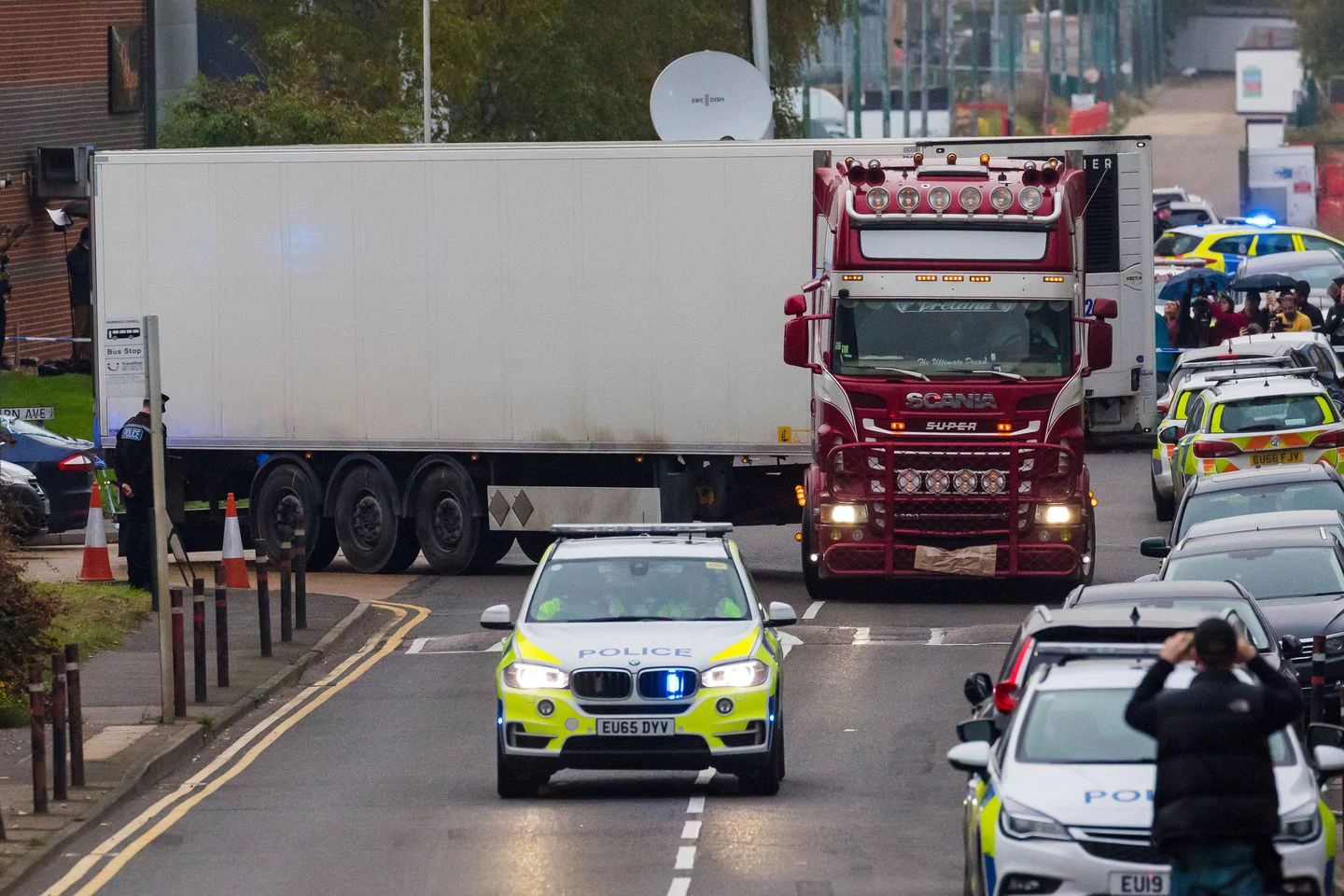Britain’s National Crime Agency said it was working to identify “organized crime groups who may have played a part.”
The bodies of the 39 people were found at Waterglade Industrial Park in Grays, about 25 miles east of central London. Police have not yet offered an account of what might have happened, but the scene bore the markings of human trafficking.
The Chinese embassy in London said in a statement, “We read with heavy heart the reports about the death of 39 people in Essex, England. We are in close contact with the British police to seek clarification and confirmation of the relevant reports.”
In an update on Thursday morning, police said that the truck itself entered the country via Holyhead in North Wales on Sunday, traveling from Dublin.
Essex Police and Belgian prosecutors said the container part arrived by sea from Zeebrugge, a Belgian port, docking in Purfleet, a small port in Essex on the River Thames, shortly after 12:30 a.m. on Wednesday.
At about 1:05 a.m. Wednesday, the truck and trailer left Purfleet, police said, and 35 minutes later, police received a call from local ambulance services saying they had discovered the container. It was unclear how the ambulance services had been alerted.
The Belgian Federal Public Prosecutor’s Office announced it had opened a case to focus on who was behind the transport. The Belgian investigators said they did not know when the migrants were loaded into the shipping container.
The case echoed previous fatal incidents in Britain involving Chinese nationals.
In February 2004, at least 21 Chinese migrants who were picking cockles on the coast — in the dark — were suddenly caught in treacherous tides and killed. The incident, in Morecambe Bay, Lanchashire, shone a spotlight on illegal gangmasters operating in the Britain.
Police on Wednesday did not name the driver, though several British media outlets have named him, citing sources in Northern Ireland, and posted photos from what were said to be his social media accounts.
“We have not speculated about the identity of this man, and we will not do so,” the Essex police force said in a statement on Thursday. They also added that this case was “the largest murder investigation in our force’s history.”
The truck was registered in Varna, Bulgaria — a port city on the Black Sea — to a company owned by an Irish citizen, according to a statement by the Bulgarian Foreign Ministry. Bulgarian Prime Minister Boyko Borissov told a local television broadcaster that the truck left immediately after it was registered in 2017 and hadn’t returned.
British Prime Minister Boris Johnson said Wednesday he was “appalled by this tragic incident in Essex.”
“I am receiving regular updates and the Home Office will work closely with Essex Police as we establish exactly what has happened. My thoughts are with all those who lost their lives & their loved ones,” he tweeted.
British authorities say human trafficking and modern-day enslavement are on the rise. National Crime Agency figures show that nearly 7,000 possible victims were reported last year — a 36 percent increase from 2017. Those people came from 130 countries, with Albanians and Vietnamese the most common foreign nationalities.
In August 2015, 71 bodies were found on a highway in Austria, inside a sealed and locked freezer truck. Most of the people were from Syria, Iran, Iraq and Afghanistan. The discovery came at the peak of Europe’s refugee influx and became one of its defining, tragic moments.
After the 2015 incident, the E.U. law enforcement agency Europol added a dedicated European Migrant Smuggling Center. In a report published this year, the center found that the most common method of smuggling involved hiding people inside vehicles. “More than 6,600 detections of irregular migrants in vehicles via the Balkans have been reported to Europol in 2018; almost 80% were hidden in concealments or transported with in high-risk circumstances,” the report said.
Rod McKenzie, managing director of policy and public affairs at the Road Haulage Association, said the journey for the people in the truck found in Essex would have been “hellish.” He said it was clear from pictures that the truck had a refrigerated unit, where temperatures can go as low as minus-13 Fahrenheit.
“It would be completely dark, probably completely airless, no sanitary facilities, possibly freezing temperatures, with the likelihood of death from freezing or suffocation enormous,” McKenzie said.
He surmised that those who sent the trailer to Essex may have chosen the route in an effort to avoid the strict checks at the popular crossing between Calais, France, and Dover. He said authorities there use sniffer dogs and monitors that can detect heartbeats, heat and CO2 levels, among other things.
“Purfleet, however, doesn’t have that level of technology to screen lorries,” he said.
Rick Noack in Berlin and Anna Fifield in Beijing contributed to this report.


















